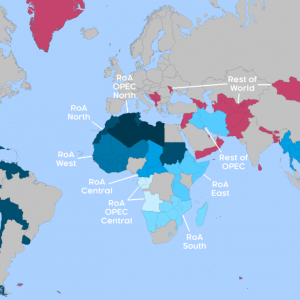Posted by: Michael McGovern
Publish date: 11th November, 2021 | 2:49pm11/11/2021

As African countries and OPEC member states play an increasingly important role in a multipolar world, we need detailed modelling analysis of these regions more than ever. Michael McGovern explains how CE have enhanced the global E3ME model’s coverage of this part of the world,…

In response to the increasing policy need to assess the distributional effects of transition to low-carbon economy, Cambridge Econometrics has developed a novel method to model local impacts, by disaggregating E3ME simulation results into regional (NUTS-2) estimates. This article…
Posted by: Hector Pollitt
Publish date: 7th July, 2021 | 2:16pm7/7/2021

As Cambridge Econometrics’ macroeconometric model, E3ME, just passed its 25th birthday, Chief Economist Hector Pollitt discusses some roots of the model and the relevance of Michał Kalecki’s work to its theoretical underpinnings.
A theory is a short cut for remembering informat…
Posted by: Dora Fazekas
Publish date: 16th June, 2021 | 9:37pm16/6/2021

Commissioned by the Swiss Federal Office of Energy (SFOE), Cambridge Econometrics worked together with the Swiss Paul Scherrer Institute (PSI) to study the link between energy pricing and the energy consumption of electricity and natural gas in Switzerland. Dora Fazekas explains …

Cambridge Econometrics recently coproduced a series of reports on the ‘Circular Economy in the EU-Africa Cooperation’ for the European Commission’s DG Environment. Part of Cambridge Econometrics’ contribution included analysis using FRAMES, a new modelling tool developed …

Cambridge Econometrics is involved in analysing the potential of Green Recovery in various projects including work for the We Mean Business coalition and the UN Partnership for Action on Green Economy. As a part of this endeavour, we also carried out an analysis of potential of G…
Posted by: Zsófi Kőműves
Publish date: 16th November, 2020 | 10:46am16/11/2020

Cambridge Econometrics and E3M have recently done modelling for the European Commission DG Energy exploring how policy conclusions differ if the same set of scenarios are estimated with two different models: E3ME and GEM-E3-FiT. This kind of exercise could be problematic. If the …
Posted by: Hector Pollitt
Publish date: 11th September, 2020 | 4:17pm11/9/2020

A recent paper written by the economist Steve Keen has been causing a storm on Twitter. It is called ‘The appallingly bad neoclassical economics of climate change’ (see also here). The paper takes aim at the small-scale ‘Integrated Assessment Models’ that have in the past…
Posted by: Pim Vercoulen
Publish date: 18th August, 2020 | 3:37pm18/8/2020

Cambridge Econometrics recently worked with the Cambridge Institute for Sustainability Leadership to look at the effect of climate neutrality on jobs and skills in Europe. As part of this effort FTT:Steel, a recently developed novel sub-module of CE’s E3ME model, has been used …

Global GDP: we currently project the COVID-19 pandemic will reduce global GDP by 5% below a no-virus baseline in 2020 and 2021
Private indebtedness: the impacts on private indebtedness suggest that the subsequent recovery will be slow: while pre-crisis growth rates are restored, the lost level of GDP is not made up (a similar profile to what followed the Great Recession)
Government action: to mitigate those impacts further, governments will need to scale up the socialisation of private debt (through direct subsidy) and not merely ensure that liquidity is provided
